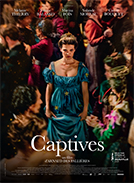Party of Fools

| Original title: | Captives |
| Director: | Arnaud des Pallières |
| Release: | Vod |
| Running time: | 110 minutes |
| Release date: | Not communicated |
| Rating: |
Mulder's Review
Arnaud des Pallières returns to fiction with Party of Fools, a film set in the late 19th century that explores the harrowing world of a psychiatric hospital through a decidedly female lens. The story revolves around Fanni, played by the talented Mélanie Thierry, who feigns madness to infiltrate the notorious Salpêtrière psychiatric hospital. Her motivation is deeply personal: she's trying to find her mother, who she's lost sight of for many years.
One of the film's first challenges is its spatialization, or rather its lack of spatialization. The director's decision to anchor the camera in Mélanie Thierry's perspective, using mainly close-ups, creates a visual confinement that doesn't do justice to the rich, immersive potential of the historical backdrop. The audience is deprived of a comprehensive understanding of the physical environment and the various characters that populate the story. If Fanni is lost within the walls of the psychiatric hospital, the audience is unfortunately disoriented.
This spatial confusion is complemented by a visually disconcerting cinematographic style. Arnaud des Pallières adopts a technique characterized by shaky camera movements, the constant interference of zoom effects and an epileptic editing rhythm. It's a curious choice, as it seems to borrow the visual codes of action films, which clash with the historical, dialogue-driven nature of the narrative. The result is a series of brief, fleeting scenes that prevent the audience from fully engaging with the unfolding story. Fortunately, occasional documentary elements, testifying to Des Pallières' experience as a documentary filmmaker, breathe a breath of authenticity into a story that otherwise lacks it.
The heart of Party of Fools lies in its exploration of the treatment of women deemed insane in the late 19th century. The film exposes the harsh reality of a time when mental hospitals served not only as treatment centers, but also as tools of social exclusion for women deemed troublesome or rebellious. The story is set against the backdrop of the highly successful film Le bal des folles, in which Dr. Charcot introduced his female patients to Parisian high society. It's a fascinating historical event that has already inspired cinematic exploration, most notably in Mélanie Laurent's Le Bal des Folles.
Despite its visual and stylistic shortcomings, Party of Fools manages to salvage its impact thanks to an absolutely stunning cast. Mélanie Thierry, who embodies Fanni's journey with a delicate balance between conviction and vulnerability, leads the pack. The always excellent Marina Foïs, as the inflexible janitor nicknamed La Douane, and Josiane Balasko, as the stern head of the clinic, contribute to a convincing portrayal of the harsh reality inside the walls of the asylum.
The film also faces a double narrative challenge. On the one hand, it follows Fanni's personal quest; on the other, it attempts to give a broader picture of the inner workings of the asylum. This dual objective becomes a narrative tightrope that the film strives to follow with grace. Subplots divert attention from Fanni's search, prompting the use of manipulative devices to inject tension into his personal journey. The film even takes an unexpected turn by introducing a false ending, a dream sequence that adds an unnecessary layer of complexity to an already complex narrative structure.
In its attempt to balance individual trajectories with collective representation, Party of Fools stumbles. The hierarchical treatment of the characters, evident in the visual choices made during moments of violence against the other inmates, accentuates Fanni's centrality to the detriment of a more nuanced overall narrative. The film even employs a peculiar technique during Fanni's solo performance at the final ball, interspersing shots of real individuals in the audience with proven psychological problems. While attempting to create a bridge between fiction and reality, this approach fails, leaving a sharp distinction between the characters and the documentary snippets.
Despite its flaws, the film succeeds in painting a haunting picture of the historical injustices suffered by women in psychiatric institutions. It highlights the arbitrary nature of their internment, motivated by harmful family arrangements or societal norms. The screenplay, co-written by Christelle Berthevas and Arnaud Des Pallières, effectively denounces these societal practices, alternating between moments of visceral anger and poignant emotion.
The film's greatest strength is undoubtedly its almost exclusively female cast. Each actress, including Carole Bouquet, Yolande Moreau and Dominique Frot, delivers a powerful performance, lending depth to the characters trapped in the cruel microcosm of the asylum. This ensemble cast breathes life into the film, providing an emotional anchor that resonates with audiences long after the credits roll.
Although Party of Fools doesn't entirely escape the pitfalls of its ambitious narrative structure and stylistic choices, its main narrative, combined with the outstanding performances of its actors, manages to elicit a deep and lasting impact. Arnaud des Pallières' exploration of the dark corridors of the Salpêtrière, while imperfect, sheds light on a disturbing chapter of history, offering a visceral and stimulating cinematic experience.
Party of Fools
Directed by Arnaud des Pallières
Produced by Jonathan Blumental, Philippe Rousselet
Written by Christelle Berthevas, Arnaud des Pallières
Starring Mélanie Thierry , Josiane Balasko , Marina Foïs , Carole Bouquet , Yolande Moreau , Dominique Frot , Elina Löwensohn , Solène Rigot , Miss Ming, Lucie Zhang , Agnès Berthon
Music by Martin Wheeler, Mathieu Ben Hassen
Cinematography : David Chizallet
Edited by Julie Duclaux, Arnaud des Pallières
Production companies : Prélude, Wild Bunch, Elle Driver, France 2 Cinéma
Distributed by Wild Bunch (France)
Release date : January 24, 2024 (France)
Running time : 110 minutes
Seen on September 9, 2023 at the Centre International de Deauville
Mulder's Mark:

